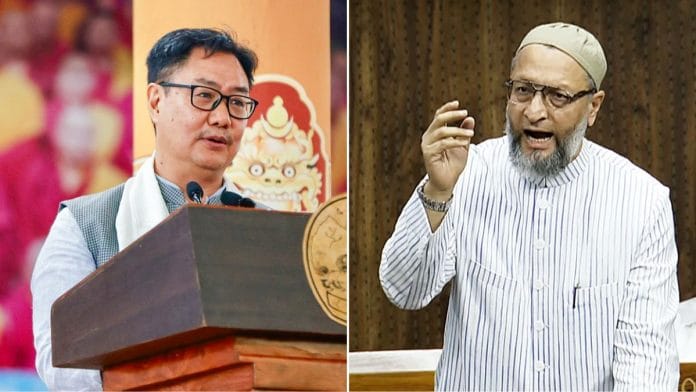Minority affairs minister Kiren Rijiju’s interview with The Indian Express set the internet ablaze on Monday. “Minorities receive more government support… Whatever Hindus get, minorities also do. But what minorities get, Hindus don’t,” he said.
His subsequent X post triggered a public spat with MP Asaduddin Owaisi. “You hold a constitutional post, not a throne. Minority rights are fundamental rights, not charity,” he wrote in response to Rijiju’s post.
Predictably, this sparked a fresh round of political theatre. Accusations flew from both sides, each vying to claim the moral high ground.
However, the real crux of the debate is the open clash between two ideas. On one hand is the old narrative, which views minorities as marginalised groups in need of protection—the victimhood narrative that has long been the foundation of political discourse. On the other hand, a new idea is on the rise: the argument that minorities are actually privileged due to the policies put in place to protect them. The implication is that the majority Hindus are at a disadvantage since they don’t benefit from the kind of policies and support systems extended to minorities.
This clash of narratives is the reality of Indian discourse. While Rijiju tallies up the benefits minorities receive, Owaisi focuses on the incidents where Muslims have been victims of lynching and hate speech. And both fail to address the nuances of India’s complex reality.
Muslim hierarchy
Affirmative action indeed exists for minorities, including Indian Muslims, who face significant socio-economic challenges. However, these policies must be restructured to address the hierarchy within the Muslim community. And it is Pasmanda Muslims who sit at the bottom.
Meanwhile, notorious gangsters like Mukhtar Ansari and Mohammad Shahabuddin are treated as respected leaders by Owaisi. Any action against such individuals is painted as an attack on the entire Muslim community, diminishing the real struggles of Muslims.
Rijiju is wrong in his claim that India is the only country to protect its minorities—there are several other nations with similar policies. But he is right when he points out that within the Indian subcontinent, Muslims are doing relatively well compared to the minorities in Pakistan and Bangladesh.
While Rijiju’s argument highlights the state of the subcontinent, it also avoids the fact that there is room for improvement. Owaisi’s side rightly argues that India should hold itself to higher standards. But there is a contradiction: the values Owaisi wants the Indian majority to uphold—inclusion, equality, and respect—aren’t the ones he lives by.
Owaisi objects to Ahmadis calling themselves Muslims, which echoes the exclusionary attitudes in some of our neighbouring Muslim-majority countries. Indian Muslims are quick to critique the majority’s treatment of minorities. Yet, we fail to question how we treat those within our community who don’t fit into our narrow definitions.
Also read: Hindi TV news channels’ favourite villain the Muslim is back—Mitthoo Mian to Muharram
Majority benefits from diversity
Commenting on the Rijiju-Owaisi spat, BJP leader Prakash Reddy argued that India’s constitutional structure exists because the majority is Hindu. To some extent, this may be true; the majority often influences a country’s identity. But the argument often gets distorted: it frames the majority as the victim, or as a benevolent entity doing a favour to an undeserving, non-secular minority. This is where we need clarity on the conversation.
A secular, inclusive, and fair society isn’t just good for minorities—it’s crucial for the majority too. When diversity and justice are upheld, it benefits everyone, not just the marginalised. Look at the countries where minorities are made to suffer. Where equality is sidelined, it’s not just the marginalised who suffer; everyone does. A society that values justice, equality, and respect for all creates stability, growth, and prosperity for the majority and the minority alike.
Despite the lack of nuance, the Rijiju-Owaisi debate is essential. It opens the door to a much-needed dialogue, which is critical if we wish to understand the complexities of India’s social landscape. The conversation allows us to question our assumptions and at least attempt to understand one another.
Open dialogue isn’t about debating benefits and policies, or pointing fingers—it’s about creating space for both sides to express their concerns, articulate their realities, and work toward a more inclusive society. Without these discussions, we risk letting misunderstandings fester and divisions deepen.
Amana Begam Ansari is a columnist, writer, and TV news panellist. She runs a weekly YouTube show called ‘India This Week by Amana and Khalid’. She tweets @Amana_Ansari. Views are personal.
(Edited by Prasanna Bachchhav)







They are dumb. Not that the average Hindu is smart. But average Muslim is dumber. They support and oppose blindly, and are used by leftists, to bring in bad policies.
They are certainly not privileged, in any sense of the term. Have never understood what the word Appeasement means.